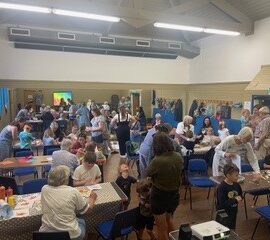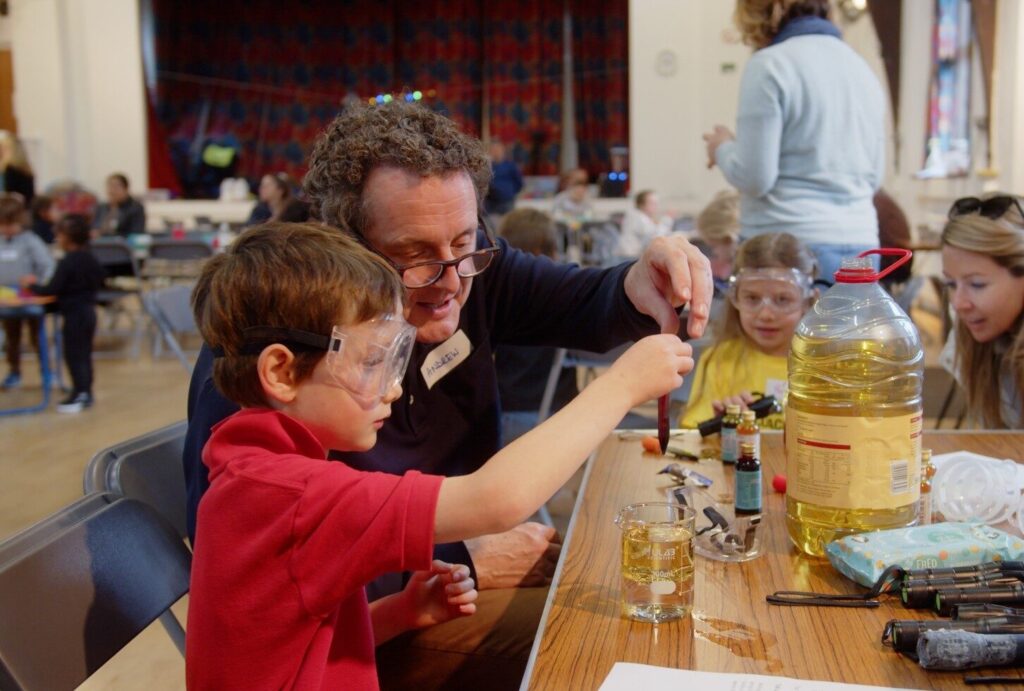The Church Growth Research paper by Rev Dr George Lings and his team has created quite a stir in the Church of England. It explores the effect of fresh expressions in ten dioceses.
Messy Church features, as you might expect in any paper about fresh expressions of church. It’s the most frequently used fresh expression, with ‘child-focused church’ and café church also occurring significantly. Of the 518 fecs researched, 165 were Messy Churches. This in itself means that Messy Church will probably be scorned from some quarters as a cliché, the obvious choice, the boring bandwagon to jump on, as success in the UK often breeds contempt.
Some details that are worth pondering: the study proves beyond reasonable doubt that Messy Churches ‘contain significant proportions of non-churched people’ (p25). So hooray for that: Messy Church isn’t just an option for disillusioned Christians fleeing traditional church.
Discipleship development is worth noting: ‘Those kinds most frequently taking some steps in discipleship include: cells, clusters, community development plants, network churches, traditional church plants and youth congregations. While some of these would automatically select the feature of small groups, the stacked bar chart shows it was not their only choice. Those kinds least likely to have embarked on any of these routes include: Messy Church, midweek church and older people’s church. Having said that, even then they are doing something in over 75% of the cases. Once more, to assert that fxC are not interested in discipleship is unfounded.’ (P50) So most Messy Churches are doing something about discipleship, and that something may not always be a traditional route. I think that’s a very exciting observation and one I would have expected – Messy Churches take a while to settle in and get confident, grow friendships and trust and only then may feel able to develop anything else intentional. The people group we’re working with are often a long way away from traditional notions of church commitment or practice. And that ‘extra’ development may not be categorised under traditional routes towards discipleship. Good.
Only 10% of Messy Churches offer Holy Communion. Well, there are some obvious answers as to why that might be. Give us time… let us get there in our own way… help us with permission and appropriate liturgies… let more clergy take Messy Church seriously… And only 22% of Messy Churches offer baptism. Again, give us time. Give us liturgy, or let us suggest some to the Liturgical Commission as we work it out in this Messy Anglican setting.
It’s also worth noticing the number of lay people leading Messy Churches rather than ordained ones, and the fact that they are mostly female. In fact I’m surprised they found as many male leaders as they did (roughly a quarter), as my Messy training events are usually around 95% women to 5% men.
George also notices the way the identity of Messy Church is being distorted by some: ‘We also assert from our qualitative studies of other new initiatives that similar distortions have occurred over what counts as café church, cell church or Messy Church. We detect a disturbing tendency for increased use of any new label that becomes popular to be in inverse proportion to accurate understanding of its meaning.’ (p82) I personally give a resigned sigh and with the team and so many of you, continue to stand up for what I think Messy Church is and can be and gently challenge those who a) see it as a stepping stone to ‘proper church’, b) those who think it’s just for children, c) don’t have a meal but still call it Messy Church, these being the main obvious distortions.
Lots more we could pull out of it and no doubt will, but that’s probably enough to muse on for now!
You may also like

Seaside Sojourn
21st Oct 2024It seems that I always get booked to deliver in-person training at seaside locations. This trend continued last weekend, as I headed off to the coastal village of Seaton, Devon.

Our Survey Said…
7th Oct 2024Back in February 2024, Church of England kindly sponsored a survey, completed by 330 Messy Church leaders. This is what we...

Storytelling from within God’s Story.
10th Sep 2024Hi Messy Friends! My name is Andrew McDonough. I live in Australia, draw sheep and tell stories. It began long long ago w...

Doing Things Differently in Different Places
6th Aug 2024When we hear these two words ‘Messy Church’, we may well have a picture in our minds of what we hope will happen and h...

